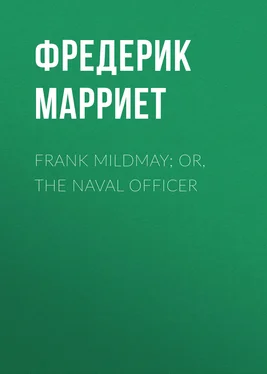Фредерик Марриет - Frank Mildmay; Or, The Naval Officer
Здесь есть возможность читать онлайн «Фредерик Марриет - Frank Mildmay; Or, The Naval Officer» — ознакомительный отрывок электронной книги совершенно бесплатно, а после прочтения отрывка купить полную версию. В некоторых случаях можно слушать аудио, скачать через торрент в формате fb2 и присутствует краткое содержание. Жанр: prose_military, foreign_antique, на английском языке. Описание произведения, (предисловие) а так же отзывы посетителей доступны на портале библиотеки ЛибКат.
- Название:Frank Mildmay; Or, The Naval Officer
- Автор:
- Жанр:
- Год:неизвестен
- ISBN:нет данных
- Рейтинг книги:3 / 5. Голосов: 1
-
Избранное:Добавить в избранное
- Отзывы:
-
Ваша оценка:
- 60
- 1
- 2
- 3
- 4
- 5
Frank Mildmay; Or, The Naval Officer: краткое содержание, описание и аннотация
Предлагаем к чтению аннотацию, описание, краткое содержание или предисловие (зависит от того, что написал сам автор книги «Frank Mildmay; Or, The Naval Officer»). Если вы не нашли необходимую информацию о книге — напишите в комментариях, мы постараемся отыскать её.
Frank Mildmay; Or, The Naval Officer — читать онлайн ознакомительный отрывок
Ниже представлен текст книги, разбитый по страницам. Система сохранения места последней прочитанной страницы, позволяет с удобством читать онлайн бесплатно книгу «Frank Mildmay; Or, The Naval Officer», без необходимости каждый раз заново искать на чём Вы остановились. Поставьте закладку, и сможете в любой момент перейти на страницу, на которой закончили чтение.
Интервал:
Закладка:
A captain seldom waits for a midshipman, and we took good care he should not wait for us. The dinner was in all respects one "on service." The captain said a great deal, the lieutenants very little, and the midshipmen nothing at all; but the performance of the knife and fork, and wine-glass (as far as it could be got at), were exactly in the inverse ratio. The company consisted of my own captain, and two others, our first lieutenant, Murphy, and myself.
As soon as the cloth was removed, the captain filled me out a glass of wine, desired I would drink it, and then go and see how the wind was. I took this my first admonitory hint in its literal sense and meaning; but having a very imperfect idea of the points of the compass, I own I felt a little puzzled how I should obtain the necessary information. Fortunately for me, there was a weathercock on the old church-steeple; it had four letters, which I certainly did know were meant to represent the cardinal points. One of these seemed so exactly to correspond with the dial above it, that I made up my mind the wind must be West, and instantly returned to give my captain the desired information, not a little proud with my success in having obtained it so soon. But what was my surprise to find that I was not thanked for my trouble; the company even smiled and winked at each other; the first lieutenant nodded his head and said, "Rather green yet." The captain, however, settled the point according to the manners and customs, in such cases, used at sea. "Here, youngster," said he, "here is another glass for you; drink that, and then Murphy will show you what I mean." Murphy was my chaperon; he swallowed his wine—rather à gorge déployée ; put down his glass very energetically, and, bowing, left the room.
When we had got fairly into the hall, we had the following duet:—"What the h– brought you back again, you d–d young greenhorn? Could not you take a hint, and be off, as the captain intended? So I must lose my wine for such a d–d young whelp as you. I'll pay you off for this, my tight fellow, before we have been many weeks together."
I listened to this elegant harangue, with some impatience, and much more indignation. "I came back," said I, "to tell the captain how the wind was."
"You be d–d," replied Murphy: "do you think the captain did not know how the wind was? and if he had wanted to know, don't you think he would have sent a sailor like me, instead of such a d–d lubberly whelp as you?"
"As to what the captain meant," said I, "I do not know. I did as I was bid—but what do you mean by calling me a whelp? I am no more a whelp than yourself!"
"Oh, you are not, a'n't you?" said Murphy, seizing me by one of my ears, which he pulled so unmercifully that he altered the shape of it very considerably, making it something like the leeboard of a Dutch schuyt.
This was not to be borne; though, as I was but thirteen, he seventeen, and a very stout fellow, I should rather not have sought an action with him. But he had begun it: my honour was at stake, and I only wonder I had not drawn my dirk, and laid him dead at my feet. Fortunately for him, the rage I was in, made me forget I had it by my side: though I remembered my uniform, the disgrace brought upon it, and the admiration of the chambermaid, as well as the salute of the sentinel, all which formed a combustible in my brain. I went off like a flash, and darted my fist (the weapon I had been most accustomed to wield) into the left eye of my adversary, with a force and precision which Crib would have applauded. Murphy staggered back with the blow, and for a moment I flattered myself he had had enough of it.
But no—alas, this was a day of disappointments! he had only retreated to take a spring; he then came on me like the lifeguards at Waterloo, and his charge was irresistible. I was upset, pummelled, thumped, kicked, and should probably have been the subject of a coroner's inquest had not the waiter and chambermaid run in to my rescue. The tongue of the latter was particularly active in my favour: unluckily for me, she had no other weapon near her, or it would have gone hard with Murphy. "Shame!" said she, "for such a great lubberly creature to beat such a poor, little, innocent, defenceless fellow as that. What would his mamma say to see him treated so?"
"D–n his mamma, and you too," said Pat, "look at my eye."
"D–n your eye," said the waiter: "it's a pity he had not served the other one the same way; no more than you deserve for striking a child; the boy is game, and that's more than you are; he is worth as many of you, as will stand between this and the iron chair at Barbican."
"I'd like to see him duck'd in it," said the maid.
While this was going on, I had resumed my defensive attitude. I had never once complained, and had gained the good-will of all the bystanders, among whom now appeared my captain and his friends. The blood was streaming from my mouth, and I bore the marks of discipline from the superior prowess of my enemy, who was a noted pugilist for his age, and would not have received the hit from me, if he had supposed my presumption would have led me to attack him. The captain demanded an explanation. Murphy told the story in his own way, and gave anything but the true version. I could have beaten him at that, but truth answered my purpose better than falsehood on this occasion; so, as soon as he had done, I gave my round unvarnished tale, and, although defeated in the field, I plainly saw that I had the advantage of him in the cabinet. Murphy was dismissed in disgrace, and ordered to rusticate on board till his eye was bright.
"I should have confined you to the ship myself," said the captain, "but the boy has done it for me; you cannot appear on shore with that black eye."
As soon as he was gone, I was admonished to be more careful in future. "You are," said the captain, "like a young bear; all your sorrows are before you; if you give a blow for every hard name you receive, your fate in the service may be foreseen: if weak you will be pounded to a mummy—if strong, you will be hated. A quarrelsome disposition will make you enemies in every rank you may attain; you will be watched with a jealous eye, well knowing, as we all do, that the same spirit of insolence and overbearing which you show in the cockpit, will follow you to the quarter-deck, and rise with you in the service. This advice is for your own good; not that I interfere in these things, as everybody and everything finds its level in a man-of-war; I only wish you to draw a line between resistance against oppression, which I admire and respect, and a litigious, uncompromising disposition, which I despise. Now wash your face and go on board. Try by all means to conciliate the rest of your messmates, for first impressions are everything, and rely on it, Murphy's report will not be in your favour."
This advice was very good, but had the disadvantage of coming too late for that occasion by at least half an hour. The fracas was owing to the captain's mismanagement, and the manners and customs of the navy at the beginning of the nineteenth century. The conversation at the tables of the higher ranks of the service in those days, unless ladies were present, was generally such as a boy could not listen to without injury to his better feelings. I was therefore "hinted off;" but with due respect to my captain, who is still living, I should have been sent on board of my ship and cautioned against the bad habits of the natives of North Corner and Barbican; and if I could not be admitted to the mysterious conversation of a captain's table, I should have been told in a clear and decided manner to depart, without the needless puzzle of an innuendo, which I did not and could not understand.
I returned on board about eight o'clock, where Murphy had gone before me, and prepared a reception far from agreeable. Instead of being welcomed to my berth, I was received with coldness, and I returned to the quarter-deck, where I walked till I was weary, and then leaned against a gun. From this temporary alleviation, I was roused by a voice of thunder, "Lean off that gun." I started up, touched my hat, and continued my solitary walk, looking now and then at the second lieutenant, who had thus gruffly addressed me. I felt a dejection of spirits, a sense of destitution and misery, which I cannot describe. I had done no wrong, yet I was suffering as if I had committed a crime. I had been aggrieved, and had vindicated myself as well as I could. I thought I was among devils, and not men; my thoughts turned homeward. I remembered my poor mother in her agony of grief, on the sofa; and my unfeeling heart then found that it needed the soothings of affection. I could have wept, but I knew not where to go; for I could not be seen to cry on board of ship. My pride began to be humbled. I felt the misery of dependence, although not wanting pecuniary resources; and would have given up all my prospects to have been once more seated quietly at home.
Читать дальшеИнтервал:
Закладка:
Похожие книги на «Frank Mildmay; Or, The Naval Officer»
Представляем Вашему вниманию похожие книги на «Frank Mildmay; Or, The Naval Officer» списком для выбора. Мы отобрали схожую по названию и смыслу литературу в надежде предоставить читателям больше вариантов отыскать новые, интересные, ещё непрочитанные произведения.
Обсуждение, отзывы о книге «Frank Mildmay; Or, The Naval Officer» и просто собственные мнения читателей. Оставьте ваши комментарии, напишите, что Вы думаете о произведении, его смысле или главных героях. Укажите что конкретно понравилось, а что нет, и почему Вы так считаете.












